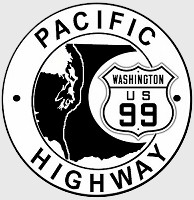
The Historic Pacific Highway
in Washington
Hudson's Bay Company's Posts

The Historic Pacific Highway
in Washington
Hudson's Bay Company's Posts
Hudson's Bay Company's Posts
Part II
By Edward Huggins
The Sunday Oregonian
August 26, 1900
To continue my story There was a magnificent view from the front of the dwelling which was erected some, time in
1830 or '32. This view I always thought was the finest and grandest in the country.
To the eastward, and apparently not very far away, towered that king of mountains, Rainier, which name has been
changed by the people of Tacoma to the latter name, Tacoma. Why its original
name, given to it by the same man who gave name to Puget Sound, Whidbey's Island
and Port Townsend, should be changed, in all fairness, I cannot, I must say find out.
Certain enthusiastic Tacoma men say that the old Indians told them that Tahoma, or Tach-oma, is its true name, but I have been for a long time, about 50 years, in the country, and for half of that time was an Indian trader, and during all that time I never once heard the mountain called Tacoma, and I am backed up in saying this by men, old settlers, contemporaneous with myself. The Indian name of Puget Sound is Wulge.
Why not call it by that name? And why shouldn't it be changed as well as Rainier? Certainly the so-called native name is much prettier than the English name and I suppose the majority of Tacomaites will continue to call it by its new name, but outside of the city and in all the maps or most of them, it is called Rainier, which is undoubtedly its proper name. I was calling attention to the splendid view of Rainier, or Tacoma, to be seen to the eastward from the front of the Cowlitz House.
To the southward, which to the uninitiated appears to be close at hand, is beautiful Mount St. Helens, its original name, and on a clear day the summit of two or three more lofty peaks are plainly, visible. I think also, that at times, the summit of Mt. Baker could be seen, but I am not quite sure of this, as it is many years since I paid my last visit to the farm, which was in 1866.
Before that time. I made frequent visits there, and in the Summer of 1855, I was in charge of the place for two or three months, or more. It has occurred to me that perhaps just here I ought to say something as to how it came about that this large farm should, at that early date, have been In existence, in this wild country, and furthermore in possession of a company of Englishmen, and to make myself more fully understood, I have thought it best to go into matters altogether foreign to my subject.
Long prior to 1846, the year of the treaty between Great Britain and the United States, which fixed the boundary line between the two countries, the Hudson's Bay Company, said to be the wealthiest English company in existence, established a line of trading posts throughout what is now known as the state of Washington, at that time a part of Oregon. With Fort Vancouver, Columbia River, the largest of all the forts, and the headquarters of what was called the Oregon department;
Fort Nisqually a smaller establishment, situated in Pierce County on the banks of Sequalitchew Creek, about six miles south of Steilacoom, and 14 north of Olympia; the Cowlitz farm, a small trading post near the mouth of the Cowlitz River; Forts Colville, Okanogan,-Walla-Walla, Boise and Hall. When these posts were established they were supposed to be within the limits, of British territory, as it was confidently supposed that the Columbia River would be the boundary line between the two countries.
I have often heard the older officers of the Hudson's Bay Company talk about how it happened that, the English Government so easily gave up its claim to south of the 49th parallel. The story is, that the British Government sent out two agents to examine and report as to the probable value of the part of the country in dispute. One of these Commissioners was a naval officer, a Captain Gordon, and the other was a son of Sir Robert Peel, at that time Prime Minister ot Great Britain.
These men, as is common with English gentlemen, were very fond of hunting and fishing, and came fully equipped for hunting and killing buffalo and big game in general. They did a great deal of hunting, but unfortunately met with very poor success, consequently they reported very unfavorably of the country. They said it was not worth a dam, and certainly not worth quarreling about.